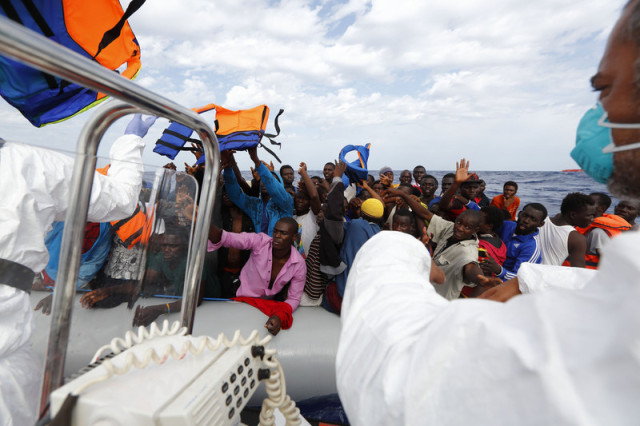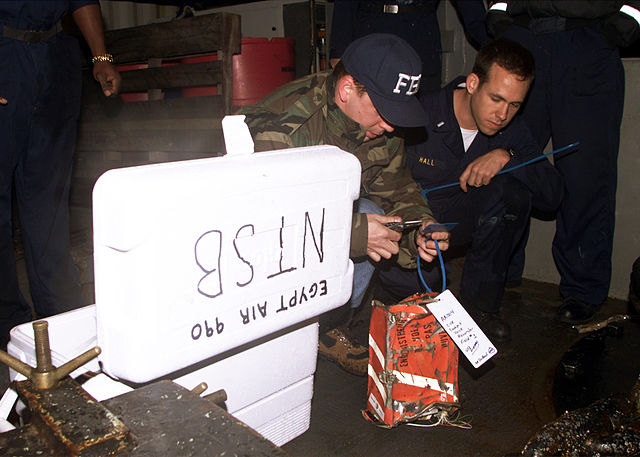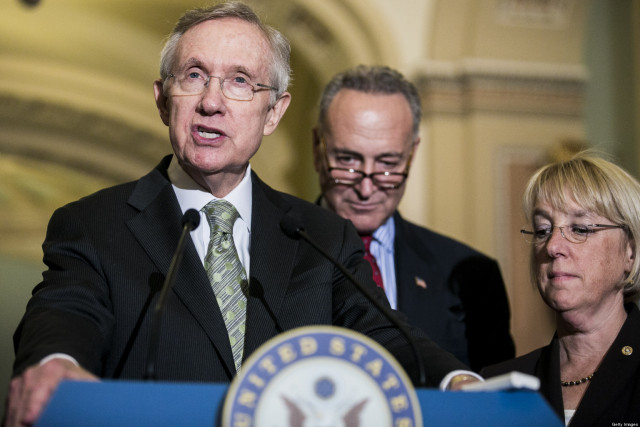The ISIS Jihad blitzkrieg seized the oil-rich Northern Iraqi City of Mosul Wednesday, while the Iraqi Army fled. This leaving nearly half a million civilians, Assyrian Christians among them, to flee to rural areas of the province of Biblical Nineveh. ISIS is the Salafist –Jihadist Al Qaeda terrorist army, the Islamic State of Iraq and Sham,the Levant.
ISIS has looted nearly a half billion in cash and tons of gold bullion making the terrorist army perhaps the largest well funded Al Qaeda affiliate. Add to that the significant oil fields and Iraq’s largest refinery in Mosul, the ISIS literally may have the fuel to follow through with their threat to attack Baghdad. Mosul was festooned with the decapitated heads of Iraqi policemen. This despite Prime Minister Nouri al- Maliki putting on a brave face calling upon his parliament to declare a state of national emergency. Now he has to rely on the loyalty of the US trained Iraqi army and militia from his Shia base to defend the capital.
Meanwhile, the Kurdish Regional Government (KRG) in Irbil dispatched its peshmerga forces to take over what they couldn’t do by plebiscite, the oil rich city of Kirkuk. A Kirkuk that the Kurds consider as “their equivalent of Jerusalem”. Now, as one report cited, just a mound of dirt separates Kurdish peshmerga from ISIS jihadi.
At risk is the future of this artificial country created by the British from the Mesopotamian Mandate of the League of Nations following WWI. Ironically the US surge strategy of General Petreaus nearly a decade ago used nation building and bribery to defeat the al Qaeda forces in the Anbar provinces and Mosul. Given current developments the refusal of the Al Maliki government to negotiate a status of forces agreement with may have contributed to this looming debacle. That choice was up to Maliki. Because of these missteps we have looming a possible Sunni Caliphate stretching across neighboring Syria deep into Iraq. Today the picture gets even murkier as Iran announced dispatch of battalions of its Quds Force to bolster the defense of Nouri al-Maliki’s beleaguered capitol. This episode may rival the legendary history of the sweep of the first Grand Jihad over 14 centuries ago. The Washington Post in a report today on these rapidly deteriorating developments in Iraq quoted President Obama saying:
“I don’t rule out anything, because we do have a stake in making sure that these jihadists are not getting a permanent foothold in either Iraq or Syria,” Obama told reporters after a White House meeting with visiting Australian Prime Minister Tony Abbott.
“I think it’s fair to say that . . . there will be some short-term, immediate things that need to be done militarily, and our national security team is looking at all the options,” he said. “But this should be also a wake-up call for the Iraqi government” about the need for political accommodation between the country’s Shiite Muslim majority and the Sunni minority, he added.
ISIS loots Mosul Central bank
The International Business Times (IBT) wrote of how much booty the ISIS secured in the capture of Iraq’s second largest city, Mosul Seized: Jihadis Loot $429m from City’s Central Bank to Make Isis World’s Richest Terror Force. The IBT reported:
Nineveh governor Atheel al-Nujaifi confirmed Kurdish television reports that Isis militants had stolen millions from numerous banks across Mosul. A large quantity of gold bullion is also believed to have been stolen.
Following the siege of the country’s second city, the bounty collected by the group has left it richer than al-Qaeda itself and as wealthy as small nations such as Tonga, Kiribati, the Marshall Islands and the Falkland Islands.
The financial assets that ISIS now possesses are likely to worsen the Iraqi government’s struggle to defeat the insurgency, which is aimed at creating an Islamic state across the Syrian-Iraqi border.
[…]
They also seized considerable amounts of US-supplied military hardware. Photos have already emerged of Isis parading captured Humvees in neighboring Syria where they are also waging war against President Bashar al-Assad’s regime.
What is really worrisome is that the vast treasury that ISIS has seized that will enable them to pay on average $600 a month to attract thousands of foreign jihadis, especially those in the West.
Just yesterday, ISIS forward elements seized Tikrit the ancestral home town of the late Iraqi dictator Saddam Hussein, putting it less than 95 miles from Baghdad. ISIS has also surrounded the city of Samarra less than 70 miles from the nation’s capital.

Kurdish peshmerga troops in Kirkuk. Source: ekurd.net.
Kurdish Peshmerga Seize Kirkuk
The autonomous KRG Peshmerga forces went into action today seizing a virtually defenseless Kirkuk. The KRG had been thwarted by the Al Maliki government from conducting a plebiscite to take back this resource rich original part of the Kurdish homeland. The Guardian’s report conveys the sense of how rapidly Iraqi forces had abandoned the defenseless city, Kurdish Peshmerga seize a chaotic victory in Kirkuk:
Capturing the city and its huge oil reserves, just outside the area controlled by the KRG, is a huge achievement. Yet victory looks far from glorious or orderly.
[…]
On Thursday Kurdish officials said they had stepped in to protect the city after government troops fled before advancing rebels from the Sunni jihadi group Isis.
Locals alleged that weaponry inside the K1 base had been seized by Kurdish Peshmerga forces belonging to both the Kurdistan Democratic Party (KDP) and the Patriotic Union of Kurdistan (PUK), the two main political forces in the KRG. But in the confusion of Iraq’s deepening crisis it is hard to be quite certain.
[…]
“There are no security concerns at this moment and the situation is calm in the city,” said Dler Samad, the Kirkuk governor’s press officer. The governor, Dr Najmadin Karim, had visited Peshmerga forces near Hawija, just 3km away from ISIS units. But a minister responsible for regional security forces survived a bomb blast as he drove into Kirkuk.

Chaldean Archbishop Emil Shimoun Nona of Mosul, Iraq. Sourcs CNS Church in Need Service.
The ISIS threat to Christians in Nineveh
We have written extensively of the flight of the beleaguered Assyrian Christians. A report by Nina Shea in the National Review On-line depicted the crisis that this ancient Christian community faces in the midst of the ISIS jihadist onslaught, The Cleansing of Iraq’s Christians Is Entering Its End Game. Shea wrote:
Mosul’s panic-stricken Christians, along with many others, are now fleeing en masse to the rural Nineveh Plain, according to the Vatican publication Fides. The border crossings into Kurdistan, too, are jammed with the cars of the estimated 150,000 desperate escapees.
[…]
Since 2003, Iraq’s Christian community has suffered intense religious persecution on top of the effects of the conflict and, as a result, it has shrunk by well over 50 percent. Mosul, the site of ancient Nineveh of the Assyrians, who converted to Christianity in the first century, has become the home of many Christians who remained. Considered by Christians the place of last resort inside Iraq, Mosul and the surrounding Nineveh Plain has been home to many Christian refugees driven out of Baghdad and Basra.

Sources: The Institute for the Study of War, The Long War Journal. The Washington Post. Published on June 11, 2014, 9:37 p.m. For a larger view click on the map.
Who do you pin the blame on?
Earlier we noted the failure of the Maliki government to conclude a status of forces agreement when the remaining US forces left three years ago. This was just as the civil war in Syria arose in bloody earnest that spawned ISIS’ terrorist Jihad in the region. The Wall Street Journal cited Sen. McCain and House Speaker John Boehner laying blame on Obama, while the Chairmen of the House and Senate Armed Service Committees, Republican Rep. Buck McKeon and Democrat Sen.Carl Levin held differing views:
Several top Republican congressional leaders Thursday blamed President Obama for what they called policy failures leading to the collapse of Iraqi armed forces and the fall of major Iraqi cities to the control of Islamist militants.
[…]
“Now they’ve taken control of Mosul, they’re 100 miles from Baghdad. And what’s the president doing? Taking a nap,” Mr. Boehner said.
Mr. McCain said the administration’s decision to leave in 2011 was politically motivated.
“The trouble is, as the events of this week show, what the Americans left behind was an Iraqi state that was not able to stand on its own,” he said. “What we built is now coming apart.”
He said the U.S. must “take immediate action” to head off the militants’ advance, and reconsider the decision by Mr. Obama to wind down the U.S. presence in Afghanistan in 2016.
[…]
Rep. Buck McKeon (R., Calif.), who heads the House Armed Services Committee, told reporters that he opposed airstrikes and any additional involvement by the U.S. in a crisis that has seen Sunni militants and Kurdish military units make incursions around the country. Iraq’s government had a chance to sign a status-of-forces agreement with the U.S. but didn’t, Mr. McKeon said.
“We lost a lot of blood, a lot of treasure there and gave them an opportunity and they wouldn’t sign the agreement,” Mr. McKeon said, adding that any assistance would add another strain to the military when officials are trying to slim down budgets. “They all take money, they all take resources, they all put people at risk.”
Sen. Carl Levin (D., Mich.), chairman of the Senate armed services panel, blamed Iraq’s government for not doing enough to unify the country and stave off sectarian violence. He also questioned whether U.S. airstrikes would be effective given that Iraqi security forces, he said, have “melted away” in some places.
“While all options should be considered, the problem in Iraq hasn’t been so much a lack of direct U.S. military involvement, but a lack of reconciliation on the part of Iraqi leaders,” Mr. Levin said.
Fred Kaplan in Slate had views close to that of McKeon and Levin in an article, “If jihadists control Iraq, blame Nouri al-Maliki, not the United States”. Kaplan is the author of The Insurgents and the Edward R. Murrow press fellow at the Council on Foreign Relations. After reviewing the success of General Petreaus’ surge in the western provinces and Mosul, Kaplan concludes about the current debacle:
Maliki has his own political problems. His party won a plurality of votes in the recent election, but not enough to declare victory…. The threat from ISIS—and it’s now a dire threat—might move some factions to strengthen the nation’s leader, or it might move more to abandon all confidence in Maliki and turn to someone else.
One hope for Iraq is that ISIS might have gone one rampage too far. While stomping through Mosul, some of their militiamen stormed the Turkish consulate and kidnapped Turkish diplomats. Under international law, that amounts to an attack on Turkey, and it’s unlikely that the Turks will simply shrug. Iran, which has emerged as Maliki’s main ally, has no interest in seeing Sunnis regain power in Baghdad. A strange alliance among all three may come to life to beat back this equally strange insurgency.
With news today that Iran is sending battalions of its elite Quds Force to fight in Iraq, Kaplan’s views appear like grasping a thin reed. Supplying more US military aid and perhaps air resources by the Obama Administration may not even put a dent into the ISIS Jihadist blitzkrieg poised to possibly conduct a siege on the capital. Iraq is for all intents and purposes a failed state. The world and we in America will pay for its possible demise with a spike in both oil and gas prices. Time for us to bolster the independence of Kurdistan and let the Shia provinces become veritable client states of Iran, while a Jihadist Sunni Emirate arises. Saudi Arabia will doubtless consider its options with the failure of Iraq further endangering the Gulf region and its oil fields. Could a regional war of global proportions be in the offing?
Will the US Embassy in Baghdad be evacuating before being overwhelmed? Stay tuned for developments.
RELATED ARTICLES:
Jihadist behind takeover of Mosul released from U.S. custody in 2009
Iraq Isis Crisis: Medieval Sharia Law Imposed on Millions in Nineveh Province
Obama: “The World Is Less Violent Than It Has Ever Been”
Decapitated heads of policemen and soldiers line the streets of Mosul as ISIS imposes Sharia
EDITORS NOTE: This column originally appeared on The New English Review.









